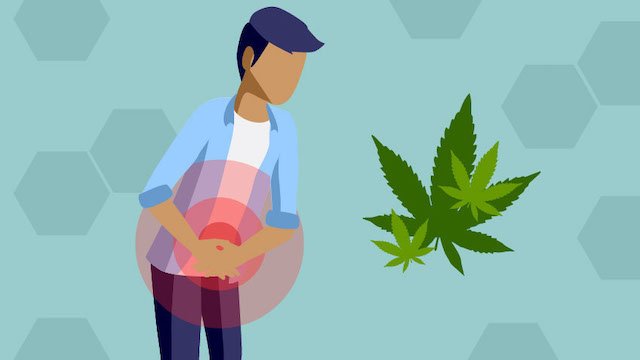
Nausea, abdominal pain and changes in appetite.
These are all things that can significantly impact one’s wellbeing if left untreated, yet they have all shown marked improvements when associated with cannabis.
Yet, less is known about the effects of cannabis on inflammatory bowel disease, or IBD, a chronic inflammatory condition that impacts the gastrointestinal tract of over 3.1 million Americans a year.
Michigan Medicine’s Jami Kinnucan, M.D., a gastroenterologist and assistant professor, specializes in IBD, ulcerative colitis, Crohn’s disease and women’s gastrointestinal health.
She spoke to Michigan Health about the use of cannabis as a treatment for IBD.
What does IBD entail?
There are two main subtypes of IBD, including ulcerative colitis and Crohn’s disease. Patients with IBD can have symptoms based on where the inflammation is present within their GI tract.
For example, if an individual has inflammatory that involves much of their colon, they may experience diarrhea, rectal bleeding and urgency.
On the other hand, if an individual has inflammation that mostly involves their small intestine, their symptoms may vary from no symptoms to diarrhea, abdominal pain and weight loss.
Some patients experience weight loss and/or anemia without any specific GI symptoms. The symptoms of IBD can vary greatly from patient to patient.
“Complementary and alternative medicine” are often heard about when detailing treatment options for IBD. Can you explain more about what this means?
Complementary and alternative medicine refers to a group of diverse medical and health care practices and/or products that aren’t currently a part of conventional medicine.
Complimentary refers to when these practices are used in conjunction with medical therapy, while alternative refers to practices used as a replacement to conventional medical therapy.
In recent years, the lines between “conventional” and “complimentary” have become more and more blurred.
As clinicians, we are still gaining a further understanding of how best to incorporate these practices into patient care with hopes of improving disease outcomes and the quality of life for our patients.
What are some of the gastrointestinal effects of cannabis?
Cannabis is composed of hundreds of phytocannabinoids, which form naturally within the cannabis plant. The two most recognized and studied phytocannabinoids are delta-9-tetrahydrocannabidiol and cannabidioil.
The effects of these phytocannabinoids act through endocannabinoid receptors. The most known receptors include cannabinoid receptor 1 and 2, or CB1 and CB2.
There are several gastrointestinal effects of cannabis that include the relaxation of the esophageal sphincter, a reduction in visceral pain, and a decrease in gastric motility and secretions, as well as bowel motility and secretions.
Some of these effects can positively impact patients dealing with IBD on a regular basis.
Historically, what are some of the overall clinical effects of cannabis in patients with IBD?
Several small studies have been conducted in patients with IBD and have shown a positive impact on clinical symptoms in some patients.
However, there are a few studies that have shown no real change in symptoms. Some of these effects include a reduction in abdominal pain, diarrhea, nausea, joint pain and an improved appetite.
The varying clinical effects are likely due to the studies using varying formulations of cannabis (i.e. inhalation, oral, etc.) and varying concentrations of THC and/or CBD.
What are the key takeaways to remember about cannabis and IBD?
Some patients might benefit from cannabis use in addition to their current medical therapy to manage ongoing IBD-related symptoms.
While studies have shown improvement in symptoms like abdominal pain and diarrhea, there’s still limited evidence suggesting that cannabis use in IBD patients treats the inflammation associated with the condition.
It’s important to remember that no studies have shown that cannabis can replace conventional therapy and all previous studies have looked at cannabis use in conjunction with continuing medical therapy.
No complimentary based treatment is without risk, and given that many complementary and alternative medicine based therapies aren’t regulated by the FDA, we don’t necessarily understand the risk of all approaches.
There has to be a review of risks and benefits before considering the addition of a complimentary therapy to a current conventional therapy.
If you are interested in incorporating cannabis (or other therapies) into your current treatment regimen, you should have a discussion with your health care provider to see if (and how) you might benefit.
As a clinician, do you prescribe cannabis for patients with IBD?
In the state of Michigan, cannabis use for recreational purposes is currently legal (as of 2019), a “certification,” which is different than a prescription, isn’t needed for patients to obtain recreational cannabis.
However medical cannabis requires a certification of a confirmed diagnosis by two health care providers.
It remains challenging for physicians to instruct patients on how to use cannabis for their medical conditions, including IBD, when scientific studies in this realm remain limited due to legislation across the country.
Written by JINA SAWANI.



